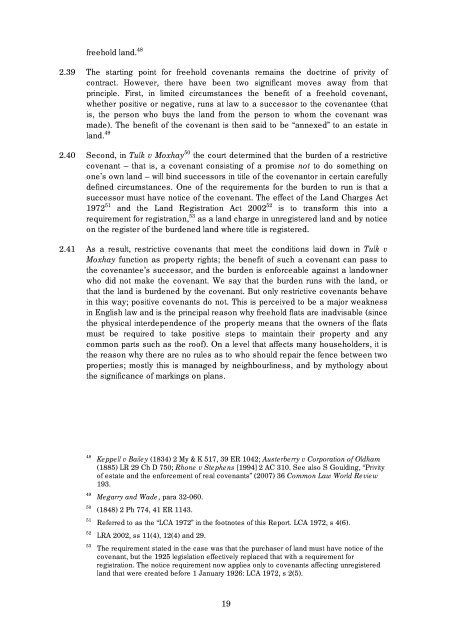Making Land Work: Easements, Covenants and ... - Law Commission
Making Land Work: Easements, Covenants and ... - Law Commission
Making Land Work: Easements, Covenants and ... - Law Commission
Create successful ePaper yourself
Turn your PDF publications into a flip-book with our unique Google optimized e-Paper software.
freehold l<strong>and</strong>. 48<br />
2.39 The starting point for freehold covenants remains the doctrine of privity of<br />
contract. However, there have been two significant moves away from that<br />
principle. First, in limited circumstances the benefit of a freehold covenant,<br />
whether positive or negative, runs at law to a successor to the covenantee (that<br />
is, the person who buys the l<strong>and</strong> from the person to whom the covenant was<br />
made). The benefit of the covenant is then said to be “annexed” to an estate in<br />
l<strong>and</strong>. 49<br />
2.40 Second, in Tulk v Moxhay 50 the court determined that the burden of a restrictive<br />
covenant – that is, a covenant consisting of a promise not to do something on<br />
one’s own l<strong>and</strong> – will bind successors in title of the covenantor in certain carefully<br />
defined circumstances. One of the requirements for the burden to run is that a<br />
successor must have notice of the covenant. The effect of the <strong>L<strong>and</strong></strong> Charges Act<br />
1972 51 <strong>and</strong> the <strong>L<strong>and</strong></strong> Registration Act 2002 52 is to transform this into a<br />
requirement for registration, 53 as a l<strong>and</strong> charge in unregistered l<strong>and</strong> <strong>and</strong> by notice<br />
on the register of the burdened l<strong>and</strong> where title is registered.<br />
2.41 As a result, restrictive covenants that meet the conditions laid down in Tulk v<br />
Moxhay function as property rights; the benefit of such a covenant can pass to<br />
the covenantee’s successor, <strong>and</strong> the burden is enforceable against a l<strong>and</strong>owner<br />
who did not make the covenant. We say that the burden runs with the l<strong>and</strong>, or<br />
that the l<strong>and</strong> is burdened by the covenant. But only restrictive covenants behave<br />
in this way; positive covenants do not. This is perceived to be a major weakness<br />
in English law <strong>and</strong> is the principal reason why freehold flats are inadvisable (since<br />
the physical interdependence of the property means that the owners of the flats<br />
must be required to take positive steps to maintain their property <strong>and</strong> any<br />
common parts such as the roof). On a level that affects many householders, it is<br />
the reason why there are no rules as to who should repair the fence between two<br />
properties; mostly this is managed by neighbourliness, <strong>and</strong> by mythology about<br />
the significance of markings on plans.<br />
48 Keppell v Bailey (1834) 2 My & K 517, 39 ER 1042; Austerberry v Corporation of Oldham<br />
(1885) LR 29 Ch D 750; Rhone v Stephens [1994] 2 AC 310. See also S Goulding, “Privity<br />
of estate <strong>and</strong> the enforcement of real covenants” (2007) 36 Common <strong>Law</strong> World Review<br />
193.<br />
49 Megarry <strong>and</strong> Wade, para 32-060.<br />
50 (1848) 2 Ph 774, 41 ER 1143.<br />
51 Referred to as the “LCA 1972” in the footnotes of this Report. LCA 1972, s 4(6).<br />
52 LRA 2002, ss 11(4), 12(4) <strong>and</strong> 29.<br />
53 The requirement stated in the case was that the purchaser of l<strong>and</strong> must have notice of the<br />
covenant, but the 1925 legislation effectively replaced that with a requirement for<br />
registration. The notice requirement now applies only to covenants affecting unregistered<br />
l<strong>and</strong> that were created before 1 January 1926: LCA 1972, s 2(5).<br />
19
















